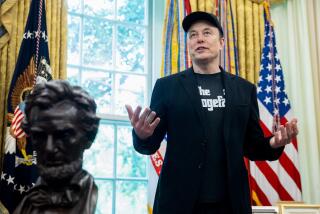Senate’s energy bill: What a disappointment
- Share via
After Senate Majority Leader Harry Reid (D-Nev.) unveiled an energy bill Tuesday that was so watered down from earlier versions that it was practically leaking on the carpet, President Obama insisted that he was still committed to meaningful action on climate change. “I want to emphasize it’s only the first step. And I intend to keep pushing for broader reform, including climate legislation,” Obama said in the Rose Garden. If we could harness that hot air, we could power a small city.
Amid tough fights over healthcare and financial reform, Obama’s push for cleaner energy ran out of gas long ago. It looked like a losing battle anyway; with Senate Republicans universally opposing a cap-and-trade program or other efforts to reduce greenhouse gases, and some Democrats in heavy manufacturing states also opposed, it may have been impossible to round up the 60 votes needed to overcome a filibuster on a Senate energy bill as strong as the one passed by the House last year. But that doesn’t excuse Obama or Reid for surrendering so easily, or so completely.
The latest Senate energy bill, which Reid claims is the best he could get through his chamber, raises the cap on damage payments by oil companies involved in harmful spills and contains billions in financial incentives for home weatherization and natural gas-powered vehicles. But not only does it jettison cap and trade, it doesn’t even contain a renewable energy standard — a set percentage of electricity that must come from renewable sources such as the sun and wind. That’s not just a disappointment to environmentalists; it’s a blow to the stalled renewable power industry.
Denise Bode, chief of the American Wind Energy Assn., says there are 60 votes in the Senate for a renewable standard, and given past supportive statements from senators of both parties who oppose cap and trade, she may be right. Count Sens. Sam Brownback (R-Kan.) and Richard G. Lugar (R-Ind.) among those who have said they’d back a renewable energy proposal. Last year’s House energy bill requires utilities nationwide to meet 20% of their load requirements with renewable power and energy savings by 2020, a relatively small but positive step toward reducing carbon emissions.
Obama, meanwhile, hasn’t just been a disappointing spokesman for clean energy; he is allowing his Energy Department to jeopardize one of his administration’s most important stimulus projects. To the chagrin of California’s Republican Gov. Arnold Schwarzenegger and Democratic Sen. Dianne Feinstein, the Energy Department has been painfully slow to approve loan guarantees on crucial solar and wind power projects in the Golden State. Unless the process speeds up before the end of the year, builders could lose out on $10 billion in stimulus funds, California could lose an opportunity to clean up its air and its power supply, and the state could lose 12,000 construction and manufacturing jobs.
Given their failure on climate legislation, the very least Obama and Reid can do is to fight harder for progress on renewable energy.
More to Read
Sign up for Essential California
The most important California stories and recommendations in your inbox every morning.
You may occasionally receive promotional content from the Los Angeles Times.













